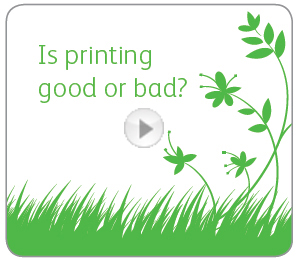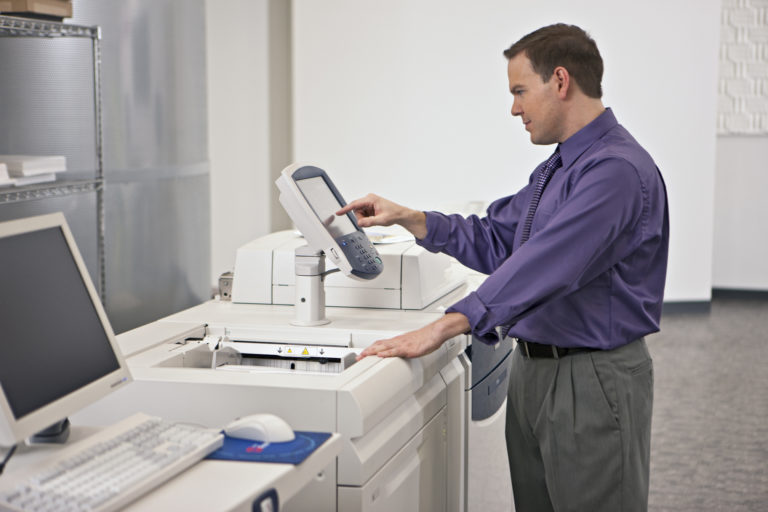Sustainability is a topic that people tend to have a wide spectrum of opinions about. Some think it is a fad while others give priority to products that have environmental advantages.
We asked our customers and people on the street to share their thoughts about printing, if they think books are going away, if they read their “junk mail” and how quickly they think corporate brochures become obsolete.

So, what do you think?
11 Comments
Comments are closed.



Print is valueable as long as it has the right content for the right recipient when it comes to direct mails. When you think about books it makes much more sense to produce them on demand instead of recycle masses of unsold books later. We found out that lot of our customers (publishers) like the idea of publishing books they wouldn’t publish before because of the minimum amount of piecec they have to produce offset. this new kind of thinking takes time to be done by customers. All in all it makes sense to think twice before print, then digital printing is the right way, we think. Combined with the right attitude to the environment during production (GO GREEN) print will last much much longer then most expect actually.
Chris, thank you for the excellent feedback. I agree wholeheartedly with you – print is valuable when it is relevant to the recipient. This is why targeted direct mail campaigns are so much more successful than spray-and-pray efforts, which lead to a lot of unread and wasted print. The digital book production business model also brings a lot of value to print. No longer are you forced into long run lengths, which carry the risk of waste and warehouse costs. Not sure if you saw it, but a few months back we featured a great story on how a European company expanded their business to include short-run books for the first time. The endeavor opened up a new revenue stream of 150,000 Euros a month. When done right, clearly print can be not only valuable, but also profitable and sustainable.
Nigroponte said, i think, that paper boooks will be extinct in 5 years. Can youagree with that? For the environment, the best book is a book that is not being printed but only being read!
Hubert – thank you for making note of author Nicholas Negroponte prediction that physical books will extinct in 5 years. While I respect his opinion, I personally do not agree with him. Physical books are much too popular and still hold a lot of benefits over electronic books. To me, nothing really compares to the feel of a book in my hand. Also, I know that if I accidently sit on my perfect-bound book it won’t break. The same cannot be said about a Kindle 😉
Books will be less widely used in the future but they are NOT going away in 5 or 50 years. Books perform an important function for civilization – they survive without attention in readilly accessible form for decades (and longer) without need of transfer to new technological platforms.
I’m a fan of the physical book myself. While some think they are helping the environment by not printing; the EPA states that 83% of electronics can’t be recycled and end up in landfills. Paper can always be recycled 🙂 It’s just about printing smarter.
Lindsay and Peter, I agree with both of you. No matter how popular eBook readers or web content gets, I find it almost impossible to envision a world without physical books. The start-up cost with eBook readers is high enough to drive some people away. Besides, a lot of us spend too much time in front of the computer as it is, and sitting down reading a book on the Internet or on a Kindle LED screen just isn’t an attractive option for everyone.
As Lindsay mentioned, printing smarter and more responsibly is the key. The advances made over the years to ensure that our paper is more environmentally sustainable are huge. When in doubt, search for the FSC stamp of approval 🙂
Für das Buch in Papierform wird Energie verbraucht, aber auch für das ebook. Am Computer ein Buch zu lesen wird die Umwelt mit der herstellung von Strom belastet.
Wichtig ist aber in erster Hinsicht, das die Menschen überhaupt noch Bücher lesen.
Denn lesen und natürlich auch schreiben machen uns zu wunderbare Naturen.
Sorry, that I write in German. It´s my best language.
Matthias
Hello Matthias, and thank you for the comment. No apology is needed, as we strive to be a global community! 🙂
I think you make a very interesting point, and I’d like to reiterate it for the rest of our readers (I can’t take credit, however, as my colleagues in Europe were of great help 🙂 ) What you are saying is that just as printing a physical book requires energy, reading an eBook also requires energy/power. Similarly, reading an electronic book/article on your computer can be considered polluting the environment with the production of electricity.
One underlying point that you clearly see is the importance that people are reading books, whether it be electronically or through the traditional physical nature. Reading and writing help drive and promote education, which put us in a position to be able to discuss topics of this nature.
There is a buzz going arround the market about the problems of recycling paper printed with technologies such as liquid toners or inkjet? is that true?
Can this be a disadvantage of digital printing for the environment?
Julio, thank you for bringing up a very interesting point in this discussion.
There have been reports, primarily in Europe, of difficulties with deinking prints made from certain technologies. At Xerox we recognize the importance of recycling and the need for easy deinkability. The deinkability of xerographic processes has been well established over many years of experience. As we introduce new technologies we subject them to third party testing to ensure that they, too, meet deinkability criteria. This past May at the IPEX tradeshow in Birmingham, United Kingdom, we previewed our high speed continuous feed inkjet technology, which received the highest de-inkability rating – “Good” – from INGEDE, a group of leading European paper manufacturers representing the International Association of the Deinking Industry. I hope this information helps!